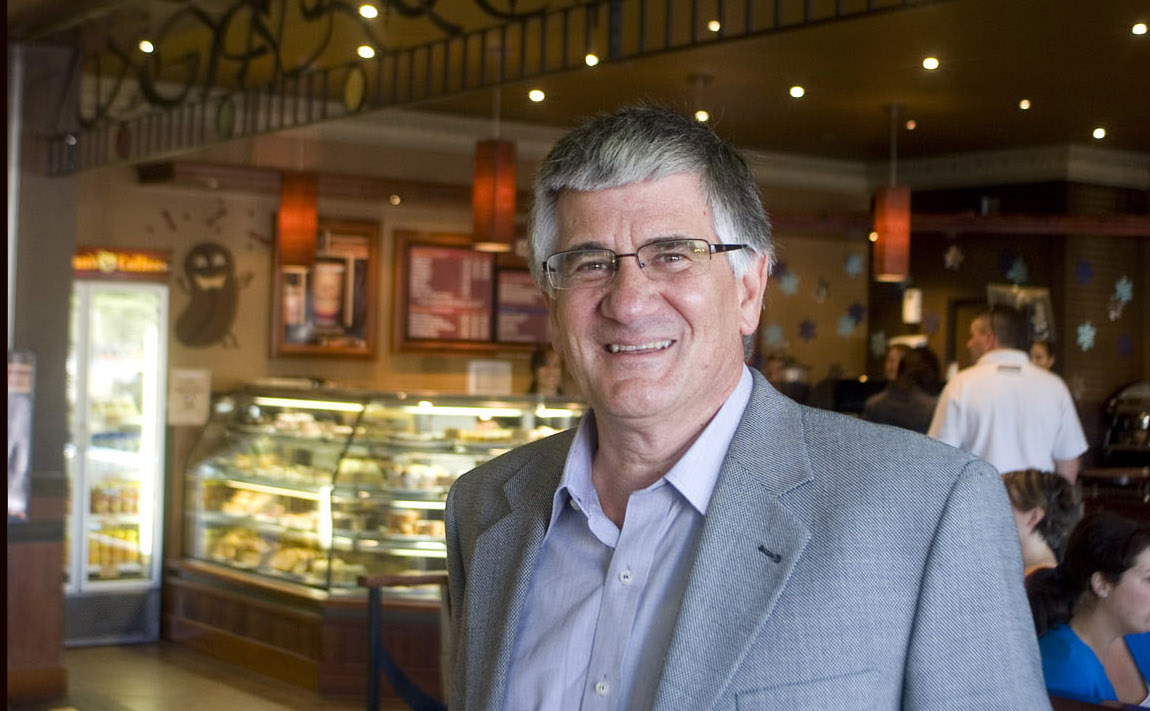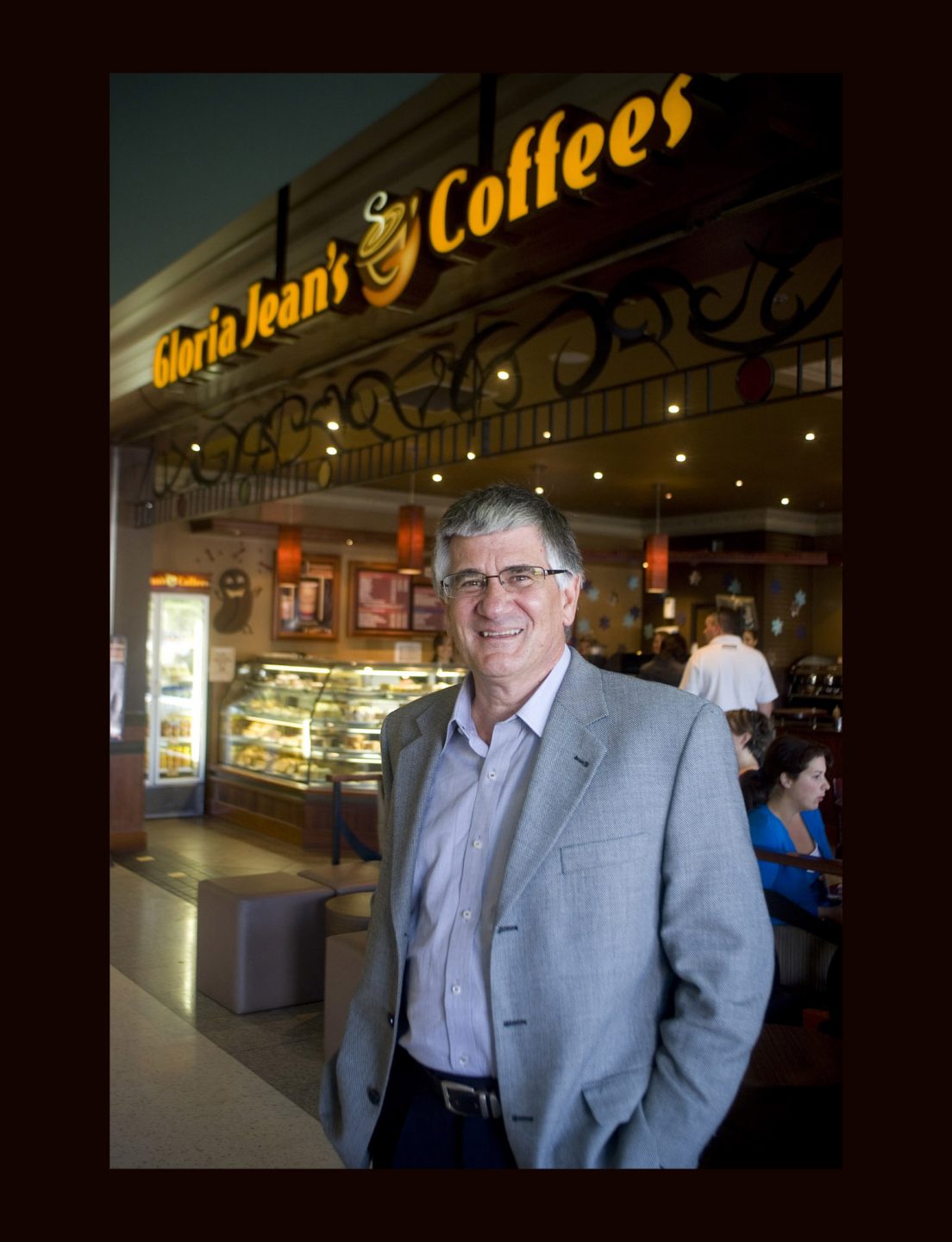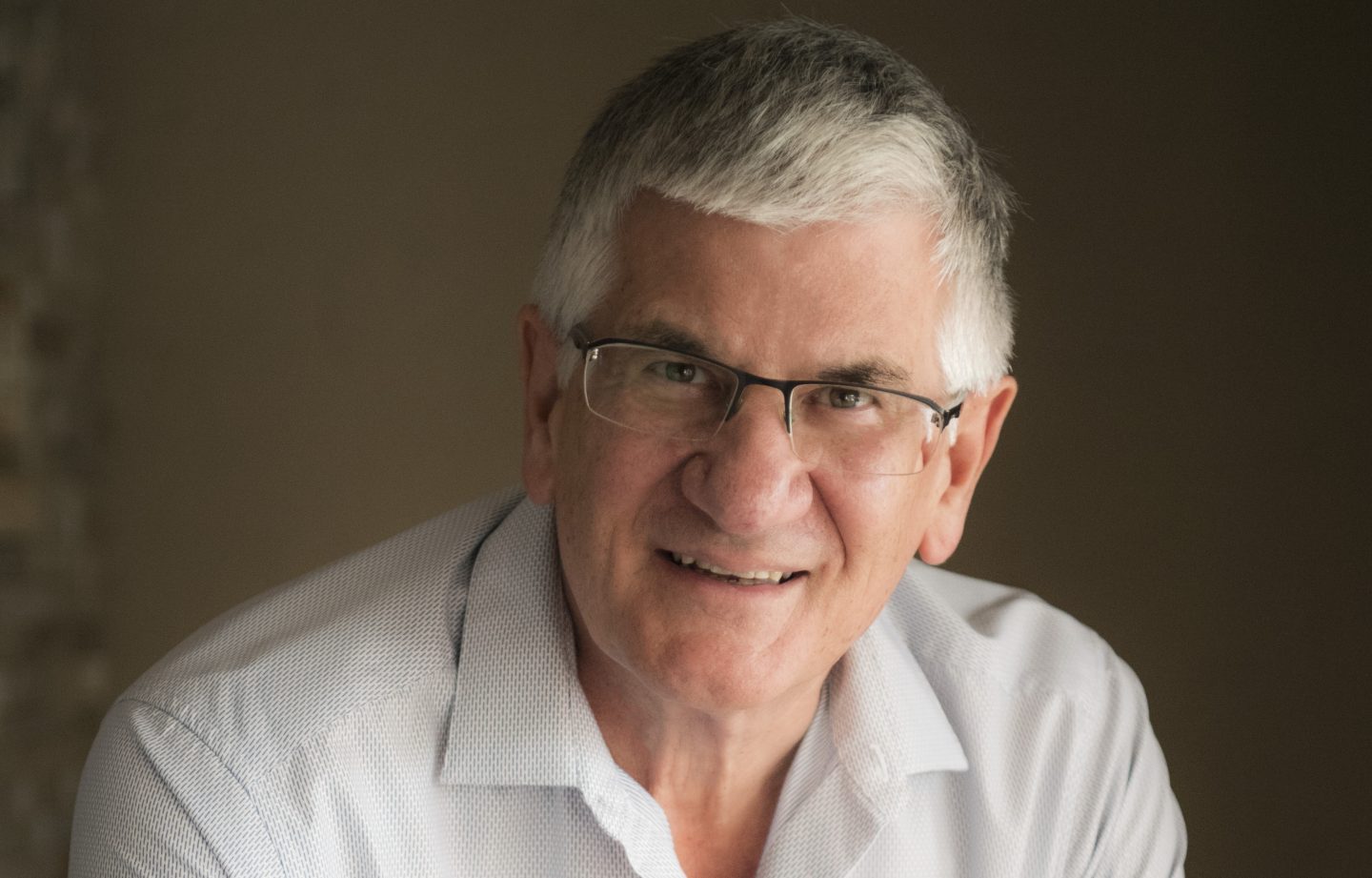“Aim high – if you shoot at nothing, you’ll hit it every time”: John Irvine, Gloria Jean’s Coffees
Peter Irvine // September 21, 2018, 12:48 pm

Peter Irvine, who has more than 50 years of business experience, was part of the team that launched McDonald's in Australia and is also the co-founder of Gloria Jean's Coffees Australia. All photos from peterirvine.com.au.
In 1995, I was running a highly profitable advertising agency in Sydney with 200 people.
When I was approached by my business partner with the Gloria Jean’s concept, I said: “I don’t know a lot about fashion.”
All I had heard was “jeans”.
My business partner said: “It’s coffee.”
I thought we could open a few cafés – that was the extent of our vision. But God had a different vision.
And I replied: “Oh I like coffee, but I don’t understand anything about the business.”
So we went to America, looked at the concept, which was a coffee-tea specialty gift store, and I could see a big future for this. I thought maybe we could open a few of these in Australia. That was the extent of our vision.
But God had a different vision.
And eventually we opened nearly 500 in Australia. Then in 2005, we bought the rights for the world – 39 countries.

At the height of its business operations in 2002, the Gloria Jean’s Coffees empire in Australia was almost wiped out by a devastating fire. But God reminded Irvine of the vision – “you’re going to build a brand, it’s going to change Australia, you’re going to bind his kingdom”.
We sold Gloria Jean’s Coffees some years ago because God had already started calling me into the business world to speak. Now 90% of my time is focused on speaking in many countries on business and leadership.
Let me share eight things I’ve learnt on my journey:
1. Set a vision and a plan
Michelangelo said the greatest danger for us is not that “our aim is too high and we miss our target, but that it’s too low and we achieve it”.
If you shoot at nothing, you’ll hit it every time.
In 2002, we had a fire. Gloria Jean’s Coffees had 92 stores open and the whole business was burning to the ground.
In the past I’d have given up. But some years before, we were going through difficulties in the business and I came home and I said to my wife, Sue: “It’s all over.”
Just because you’re going through issues, it doesn’t mean the vision is over.
And she said: “You don’t understand – it’s not over until God says it’s over. He’s given you a vision, and He’s not going to allow it to die.” (This is why you need a good wife.)
Just because you’re going through issues, it doesn’t mean the vision is over.
There will always be obstacles. There will always be recessions. There will always be difficulties. There will always be issues.
But if it’s God’s plan for you, He will see you through.
When Henry Ford made the first motor car, he forgot to put in a reverse gear.
We’ve got to get rid of the reverse gear in our thinking and allow Him to speak into our lives. We need to be looking forward to what God has for us.
Proverbs 29:18 says where there is no vision, the people perish.
2. Value your people
In 2002, at 8 minutes past midnight on October 3, we received a phone call.
Sue answered the phone and told me: “The warehouse is on fire.”
I said: “Thank goodness I’m dreaming.” And she said: “You’re not.”
So we got there and our roasting plant, our warehouse, our training centre, our offices, were all burning to the ground.
After a few hours the fire chief said we might as well go home, there was nothing we could do.
So we got back home but I said to Sue: “I’m going back there at 5.30am. I should be there before the warehouse guys arrive at 6 o’clock.”
So I got there at 5.30 and there were now three television news helicopters, fire engines, police security.
My phone rang; it was my courier. He said: “I just saw the fire in the news. I collected the coffee beans for the two new stores yesterday. Do you want me to bring the stock back?”
I thought to myself: “Yes, we really need stock.”
And then God reminded me of the vision – you’re going to build a brand, it’s going to change Australia, you’re going to bind his kingdom.”
Negative people tell you what’s not possible. With God all things are possible (Matthew 19:26).
So I said to the courier: “No. There’ll be two new stores tomorrow as a testimony and a message to everyone that we’re not going anywhere.”
I had no idea how this was going to happen.
But I learnt some years ago that when you make a decision, you don’t make it to solve a problem today, you make it with an eye to the future. That’s why you need a vision.
Just before 6 o’clock, the guys who roast the coffee arrived first.
I said to them: “It’s okay, guys, the coffee’s all roasted.”
The cleaner arrived, I looked at her cleaning supplies and said: “You’re going to need more than that.” She didn’t laugh.
So there were a lot of sad and funny lessons.
But because we hired the staff who were committed to the business, they all locked down together and rebuilt the business. And no jobs were lost.
Just having the right people will see you through the journey.
3. Have a “yes” face
When the alarm goes off in the morning, do you pick it up and throw it across the room? Or do you see it as an opportunity clock?
By the time you get to the breakfast table and listen to the death and destruction of the economy on the news, you’re going to be miserable.
A business guy said to me: “What do I do about the global financial crisis?”
I said: “Stop watching the news.”
In its place listen to some encouraging things. Your pastor’s going to preach a good message occasionally. Listen to it. Build yourself up.
We’ve got to learn to be consistent – that’s our testimony in the marketplace.
Thomas Jefferson, one of the US Presidents, was travelling by horseback with a group of men. They got to this swollen river.
One guy on foot said to the President: “Can I get on the back of your horse?” And he said: “Yes.”
When they got to the other side, the group asked the man: “Why did you ask the President for a lift?”
And the guy said: “On your faces was no, and on his face was yes. He was the only one who believed I could make it across.”
Do you build and encourage people? Or do people want to be away from you because you’re so negative?
If your words to your workers are negative, that’s how your staff will relate to customers.
Negative people tell you what’s not possible. With God all things are possible (Matthew 19:26).
4. Keep learning
There’s research out of America that says that, at 67 years of age, most people have nothing new to say.
Well, I think that at 20, 30, 40, 50 years, most people have nothing new to say because they don’t read, they don’t listen, they don’t watch.
And I was one of them.
Not all that long ago I started reading, listening, learning, challenging myself.
In the USA, 3% of people have a library card and 6% believe Elvis Presley is alive.
I say to people: “Use your library card as your university.”
A great resource is John Maxwell’s Leadership Bible. It takes you through the whole Bible and talks about leadership, momentum, vision, delegation – lessons that will build you on your whole journey.
5. Build relationships
In my country, we’ve been sold the big lie that family and business don’t mix.
Ray Kroc, who founded McDonald’s, said: “I believe in God, family and McDonald’s. But at work, the order is reversed.”
I have a couple of problems with that.
One is that he’s a different person at home than he is at work.

Irvine credits his wife, Sue, for being a strong support through decades of business fluctuations. When faced with challenges, Sue reminds: “It’s not over until God says it’s over.”
We’ve got to learn to be consistent – that’s our testimony in the marketplace.
The second thing he’s saying is that God is first, family is second, business is third. And then reverse it for work.
Most people usually give God two hours on Sunday and do what they like during the week.
That’s not our testimony. God wants to be part of everything, not what we select Him to be part of.
So I say to business people: “When you get home, if you’re on the phone, finish the call before you go inside. Let your family know they are your priority.”
I say to guys: “When you get home, sit your wife down and – of course she’ll probably faint when you ask this – invite her out on a date.”
One guy said to me: “Well now I’m married, do I still have to take my wife out?”
I said: “Well, you probably won’t be married for long.”
6. Stop messing with dead things
The global financial crisis at the same time as the growth of social media has changed the way we do things forever.
People research differently, they buy differently. And we have to think of new ways of connecting with people.
There’s a saying: If the horse is dead… dismount!
We’re still riding practices that are irrelevant, we’re still riding attitudes that don’t work, we’ve still got systems and processes that we invented and we’re attached to.
Well, get over it.
We’ve got to learn how to change. Our message doesn’t change, but our delivery does.
There was an experiment in Australia featuring a grocery store without groceries.
A wall at a major railway station in Sydney was rigged with colour product photos with bar codes. People in a hurry selected their products using their smart phone, and then selected a home delivery service.
So you get all your groceries home delivered and you haven’t even touched the product. That’s using technology to do things differently.
Technology need not take away business, technology can enhance business.
7. Pay attention to marketing
It was Mitsubishi Motors New Zealand that advertised: Buy a brand new Mitsubishi and we’ll give you a goat for free.
This was so quirky, both the New Zealand and Australia media picked up the story and ran it nationally.
So just for the quirky idea, not only did Mitsubishi get national coverage they can’t pay for, but it actually appeared in two territories.
During the global financial crisis, this hairdresser opened on the main street. He put up a sign: Men’s haircuts $20.
Six months later, another hairdresser opened on the other side of the street, and put up the sign: Men’s haircuts $5.
The banks said to the first guy: “You need to drop your prices.”
He did the right thing and ignored them.
Instead he put up a new sign: Men’s haircuts $20. We fix $5 haircuts.
So it’s important as a business to look at your marketing.
You need a core idea that is your main selling proposition – something that makes you stand out.
8. Support the community
When you partner the community, your business grows.
Years ago, the New South Wales government rang me and said: “We want you to open a Gloria Jean’s in the new women’s prison. There’s a lot of foot traffic.”
They said that when we train the inmates, they’d have a skill when they rejoined society. So we agreed to do this.
Opening anything in a prison is enlightening. We hired the women to make coffee, serve food, clean tables.
When you partner the community, your business grows.
The first girl we hired said: “Do you realise I’ve been in here three times. But I now believe I’ve got a future.”
We were told: “No publicity – the media will criticise us for running a business in a prison.”
But 10 days before the opening, word got out. I didn’t release it, but someone did.
I got a call at 6am in the morning to be at the prison because the minister and all the media, were going to be there and they interviewed us and ran positive stories for days and our business went up by 30%.
So when you get involved in the community it actually builds your business as well.
When we bought the rights to Australia, we opened 25 stores. In 10 years we opened 300. And we bought the international rights. That wasn’t our plan.
We had a business plan but our vision wasn’t big enough. God brought us far enough along the journey to open our eyes.
After all those years of working, I didn’t know I’d be talking to business people, training, speaking.
There’s no drifting off and doing nothing for the rest of your life.
When we finish our career in business, God leads us to the next stage. Just take what He challenges you with.
There’s no retirement in the Bible.
This article was adapted from a talk on “Building your Business, your People, your Life” by Peter Irvine at an Alpha Singapore marketplace lunch, and is published with permission.
We are an independent, non-profit organisation that relies on the generosity of our readers, such as yourself, to continue serving the kingdom. Every dollar donated goes directly back into our editorial coverage.
Would you consider partnering with us in our kingdom work by supporting us financially, either as a one-off donation, or a recurring pledge?
Support Salt&Light




